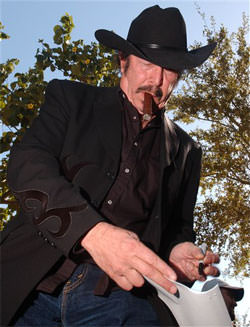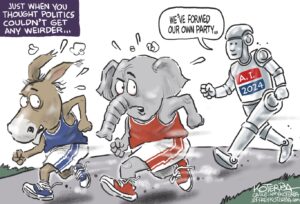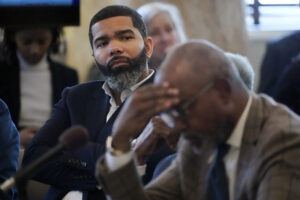Kinky Friedman’s Ten Commandments
The always entertaining Kinky Friedman, author most recently of "You Can Lead a Politician to Water, but You Can't Make Him Think: Ten Commandments for Texas Politics," tells Truthdig why the Internet is the work of Satan, why politicians are "stuck on stupid" and why even God couldn't beat the Republicans in Texas.
James Harris and Josh ScheerThe always entertaining Kinky Friedman, author most recently of “You Can Lead a Politician to Water, but You Can’t Make Him Think: Ten Commandments for Texas Politics,” tells Truthdig why the Internet is the work of Satan, why politicians are “stuck on stupid” and why even God couldn’t beat the Republicans in Texas.
Transcript:
James Harris:
This is Truthdig. James Harris here with Josh Scheer. And today we welcome Kinky Friedman, renowned singer, songwriter, columnist, and now the author of the new book “You Can Lead a Politician to Water, but You Can’t Make Him Think: Ten Commandments for Texas Politics.” Certainly the longest book title I’ve seen since the Bush administration began. But, Kinky. …
Kinky Friedman: [Laughs.] It’s a long title and a short book.
Harris: Thanks for joining us. Before we get into this book — when we started off here you were telling me that the Internet is the work of Satan. What are you — ? Come on! The work of Satan?
Friedman: First of all, for a creative person, I don’t think it’s any good. If you’re writing fiction, or something, it kind of makes you be mediocre. You realize you can fix everything. And that’s not a good mentality. The best is to just write the page and if you don’t get it just the way you want it, then you tear it up and throw it in the fire.
Harris: Start again? So it kind of takes some creativity from the kids? I could stand with you on that. But the “work of Satan,” though?
Friedman: Sure, it does ’cause a theater kind of person thinks, “Well, I didn’t get this part right, but I’ll punch it up, I’ll fix it later, I’ll get that character right.” It may work for doing your taxes or doing numbers. The other problem I know about the Internet is, people are talking to 15-year-olds that are really …
Harris: 38 or 60?
Friedman: … vice cops in San Diego or something, and a guy is pretending to be 50 years younger than he is and all kind of weird stuff going on. And then the rest of the people are just deciding who is the best “Star Trek” captain.
[Laughter.]
Harris: Don’t get all evangelical on me. Don’t tell me it’s the work of Satan. I know some bad stuff goes down, but — .
Friedman: [Theatrical voice.] The work of Satan.
Harris: [Theatrical voice.] And Jesus will save you! [Normal voice.] Well, Kinky, tell me about this book, “You Can Lead a Politician to Water but You Can’t Make Him Think.” Why did you choose the title and why is this book different? We know these guys aren’t that smart. What are you giving us new here?
Friedman: Well, the title was suggested to me by my spiritual adviser for the [recent Texas] campaign, Billy Joe Shaver, who also gave me the slogan, “If you don’t love Jesus, go to hell.”
Harris: [Chuckles.]
Friedman: But we know we’re living in George Washington’s worst nightmare. The Crips and the Bloods, as I call them, the bullies on the playground, have created a bipolar system here that George Washington never wanted to see. All he wanted was common sense and common honesty, in government, neither of which we have today. So you wonder why health care is not going to go through, the same reason immigration didn’t. Politics.
Harris: It just comes down to politics and politics just being, just stupid, the whole process. Is it?
Friedman: Yeah, they’re stuck on stupid, and poly means more than one and ticks are bloodsucking parasites.
Harris: [Chuckles.]
Josh Scheer: That’s a good line from your book. I want to ask you because you talk a lot in the book about apathy. And you talk about Bill Hillsman, who was doing Jesse Ventura’s campaign, helped you with your campaign, talking about breaking apathy. And I think the percentage you had in the book was 29 percent [of] Texas voters actually voted. How do you get people excited about elections? How did Jesse Ventura do it? I know that you also talked about the debates, that he had 16 to your one. How can we get involved? How can the average person get involved and create a system less apathetic.
Friedman: Well, first of all, the average person now that is pretty disgusted with the politicians is definitely the majority in this country. It’s like Mark Twain’s time. When Mark Twain said there’s no native criminal class in America except the U.S. Congress. We realize these people are not lawmakers; they’re lawbreakers, and that the longer you’re in, the more experience you have in politics, the worse you get. And we just can’t trust somebody that’s been a public servant for 20 or 30 years
Harris: You can’t — .
Friedman: I think there’s a lot of things we could do. Some states are doing them now. Texas is not. Same-day voter registration is one. Never re-elect anybody, is always a good idea. And I’d like to do what Australia did. I would’ve been [Texas] governor by a landslide if we’d had mandatory voting like Australia has, which is not like Saddam Hussein had. All this is is you’ve got to show up at the polls, you don’t have to vote, but you’ve got to get your name checked off, and if you don’t show up, you pay a nominal fee of maybe 50 bucks, a fine. That’s resulted in about 97 percent of eligible Australians voting, and it has just really decimated political corruption in Australia.Harris: That’s a good point, but is it going to happen? I think the most powerful point about your book is that it points out all the inconsistencies, the shortcomings of the process, of the politicians. But, still, we sit here and there’s not a whole lot we can do. Is it …
Friedman: Well, we can — .
Harris: … just an idea, or is there something, really, that we can get at?
Friedman: Well, we all look at the candidates that are running for president, and I don’t know about you guys, but I am not inspired by any of them. There’s a couple of them that I like, but none of them inspire me. …
Harris: Fred Thompson does not inspire you. Are you serious?
[Chuckles.]
Friedman: Who doesn’t?
Harris: Fred Thompson does not inspire you?
[Laughter.]
Friedman: Fred Thompson. No, Fred doesn’t inspire me. In the beginning Obama had a little bit of freshness and excitement, because he has, I think, less political experience than I do. But by the time he’s through with the process, they’re going to burn him out. He’s going to be a hack like the rest of them. There’s just something about politics that drives the Karl Roves, that draws the worst kind of people to it. When I said a musician can better run this place than a politician — boy, I’m telling you: the musicians I dealt with in the campaign — you know, Jimmy Buffett or Lyle Lovett or Willy Nelson — these are really good, decent people. It’s hard to find a musician who isn’t creative and decent and honest, and you can’t find a politician like that. There just isn’t one. Maybe there is one somewhere.
Scheer: It was a good line, I think: “They would come in to work late, but they’d work late and be honest,” was the musicians, right?
Friedman: Yes, yes, the musicians. We wouldn’t get much done in the morning, but we’d work late and we’d be honest.
Scheer: I want to ask you something because my co-host here spends some time in Georgia and I know you had the chapter, “What Has Six Balls and Screws Texans?” about the lottery and all that, and you talk about Georgia, how, if a student has a B average the lottery gives them a full, free ride to college. I was very interested in how that might work for the whole country. Can you explain a little bit about that, how Texas — .
Friedman: I was just in Atlanta for this book festival last month, and I asked the people, I said, “Look, is this really true that your lottery can provide a four-year free scholarship for all those kids to a state university here?” And they said, “Absolutely. We’ve been doing it for a while. And what it does,” they explained, “this cuts the brain drain. The smart kids will stay in Georgia now because you would with a free four-year scholarship.” You’ve got to think about the Texas lottery. It’s got to be a hell of a lot more than Georgia’s, but we don’t know what happened to all our money here. All the politicians will say is that it went into the general fund. Well, the biggest crisis we have in America today is we don’t trust the government, with very good reason. Stupid ideas that they have about immigration, just insane. I’m trying to figure Newt Gingrich’s idea — that was the best one I heard — which was to Fedex all the illegals, send them Fedex packages and track them so we can find them. At least I trust Fedex to do something right, you know? I do not trust our government to try to find illegals and send them back home and get them certified and bring them — . We couldn’t even evacuate New Orleans.
[Chuckles.]
Harris: Kinky, you talk about the general fund. The general fund is a lot like the building fund at some churches. They’ve had them for years, then they change the doorknob on the church and you know where that money goes.
A question for you, Kinky. I benefited from the Hope Scholarship. I went and I had my 3.0 and it was free, and my dad said, “Don’t every use it, boy, or I will hurt you.” And I kept it and it worked out. But why don’t more states know about this. Why aren’t more governors on the track with this? Why is this a big secret and why such an impossible thing? Honestly.
Friedman: One of the reasons is that the media is complicit in this. The media is lazy as hell. The media spent — . I can’t tell you how much time spent trying to see if I said the N-word 27 years ago on a stage. And, also, did I drink a Guinness from a moving vehicle during the St. Patrick’s Day parade in Dallas. That was called “Guinness-gate.”
[Laughter.]
Friedman: And they did get a picture of me, drinking and I wasn’t driving the car. So I said later that I admitted that I did drink the Guinness but I did not swallow.
[Laughter.]Friedman: That’s what the media’s interested in. The fact that nobody can find any of the education money having gone to education in Texas in any way — to a student, to a teacher, anyone associated with education or any … if it had bought some computers for a poor school system or something, but it hasn’t. So this is a huge amount of money that’s unaccounted for, and I don’t see anybody — . I’m not blaming the politicians as much as … the people; we are as much at fault. If 28 or 29 percent of us vote, this is exactly what you’re going to get: You get a ribbon cutter for your governor.
Scheer: It’s actually interesting, because when I was reading the book, from the media, from what we’ve seen — we’re based in California, I’m sure other people saw the same thing: the one-liners …
Friedman: Right.
Scheer: … or those kinds of things. When I was reading the book, a lot of your solutions are great solutions, they’re common-sense solutions, and they seem like, if people would put them into practice, they would work. Like the Texas Peace Corps …
Friedman: That’s a great idea.
Scheer: … or No Teacher Left Behind, and, obviously, the mandatory voting. All these issues never got covered. I think you and Sam Houston are the only two independents — right? — to ever run for governor.
Friedman: That’s been a long time between dreams: 154 years.
[Chuckles.]
Scheer: Is any independent, anybody who’s not of the status quo? Is the media already going to shoot them down? Do they have a shot? Is there a way of overcoming that, like Jesse Ventura did or a few other people in society in this country?
Harris: Mike Gravel is a good example. He stands far, far, far apart from what other guys are saying. So he’s a realistic example. Does he have a chance, Kinky?
Friedman: Who are you just talking about, after Jesse?
Scheer: Oh, James is talking about Mike Gravel, the former senator from Alaska. … I’m thinking of Bernie Sanders of Vermont, and those kind of guys.
Friedman: I think in places — well, we’re not in Minnesota, Toto. That’s the important thing to remember.
[Chuckles.]
Friedman: That’s a very progressive, homogenous state, and Jesse had everything working for him. They had matching funds from the state, they had same-day voter registration. Jesse told me that morning of the election when he saw the lines of kids waiting to register and then vote, he knew they had something going, he knew that they had a real chance. Here in Texas the campaign caught fire when it should, right in the last few months, but half the kids turned around and realized, “Hell, I didn’t register two months ago; I can’t even vote.” What is the purpose of that except to suppress the vote? Why would we want to have that kind of poll-tax mentality down here?
Scheer: Hmm.
Friedman: So I think in Vermont, Connecticut, Minnesota, I think an independent can win. I think in Texas, I don’t think God would’ve won if he’d run against Rick Perry and the Republican machine. God knows the Democrats haven’t won in 14 years. So I may try again. But if I do, it will definitely be as a Crip or a Blood.
[Laughter.]
Friedman: I believe it will be as a Blood, as a Democrat, because we’ve got to get the wooden horse inside the city. We’ve got to get an honest broker elected before we can fix education, health care, and abolish the death penalty, which is hanging over Texas. I’m telling you: The world would stand up and cheer if Texas would abolish the death penalty.
Scheer: Early in the book you talk about how the president — that you’d known him and Ann Richards as governors and Rick Perry — you say you know two and a half Texas governors because you thought Rick Perry was a wine steward, but — .
[Laughter.]
Friedman: Watch out because he could well be vice president.
Scheer: Yeah.
Friedman: He endorsed Rudy this morning [Oct. 17], so the fix is in. That could at least make George Bush’s legacy look a lot better if Perry is vice president.
Scheer: But in the book you say that George was willing to help you out. Did that ever come to fruition? Was he at all helpful to you?
Friedman: No, not at all. Once, I think as soon as he realized that things were — as the campaign moved along, we started to do pretty well, better than people expected, and by three or four months before the election we were doing really well, and that’s when they started to really slam us.
Scheer: Yeah.
Friedman: The Republicans and the Democrats. So they did kind of what they did to Ralph Nader. The Democrats spent millions to destroy him. I don’t know why they care about Pat Buchanan or Ross Perot or Ralph Nader. These guys are not going to be elected president, and they do have some new ideas.Harris: They do, but we let them go. Here’s a thought: Can you help me understand what is on the mind of the president these days? He’s kind of in a lame-duck place, but he’s not. He’s fully capable of changing policy, of moving bodies, but he’s doing nothing and he’s kind of getting cowboy. And that’s why I’m asking you, Kinky, because you’re a cowboy.
Friedman: I’ve shared ashtrays with two presidents, Bill and George, and I think George is a good man trapped in a Republican’s body, and he’s like a pedigree dog. He can’t help it, it’s not his fault. He had Colin Powell with him, who probably gave him some pretty damned good advice on Iraq, and he didn’t take it. And any political guy like Gen. Patton, if he looked at what we’re doing over there, would I’m sure say it’s absolute insanity, and it is. So I think that’s why Bush wanted the immigration bill so bad. He’d like to have some kind of legacy besides Iraq. And just like it’s a shame what happened to LBJ. LBJ and Martin Luther King were the twin architects of the modern civil rights era. And people never credit LBJ for that; they always think of him as Vietnam.
Harris: But he signed the act. It wasn’t Kennedy. Fascinating.
Friedman: Yeah.
Harris: Cowboy to cowboy, you say he’s an all right man, talking about W, but he’s got his ass in a sling. But didn’t he help out a little bit? It’s not like he was walking down the street and somebody shot him; he helped do some shooting!
Friedman: Well, you know there are two kinds of people who wear cowboy hats: cowboys and assholes.
[Laughter.]
Friedman: I think George is — I don’t think he’s stupid. I think he’s a bright guy, and I think things have gotten — . Why in the hell have we been elevating the Shia over there and now finding out that Iran is going to take over the whole thing because the Shia are their boys. We seem to have set this thing up exactly backwards. It’s certainly sucking all of the State Department people. All of our best people are in Iraq or going there, and people are dying and money of course is going there endlessly. And meanwhile you have something really bad, like Burma, going on.
Harris: Yeah.
Friedman: That’s what we ought to be doing, is kicking all those Burmese generals’ asses. I think Laura Bush, at least, is trying to do that. But our official government policy, we should be getting rid of those people if we can, if we believe in freedom.
Harris: I was going to ask you about Don Imus, but I won’t even go there, because he’s coming back on the radio.
Friedman: He’s coming back. He’s like Jesus. He’s coming back, and, boy, is he pissed.
[Laughter.]
Friedman: I think Imus got screwed pretty badly on that deal, and I would just say about Al Sharpton — . Sharpton is a … like I told Bill O’Reilly the other night, I said, “Your pal Al Sharpton. …” O’Reilly was saying musicians shouldn’t be talking about politics because they don’t know what they’re talking about.
Harris: But what about Sharpton?
Friedman: Well, I was saying, Sharpton’s a pro. He’s one of Bill’s friends and he’s the guy Bill thinks is a professional. He is, he’s a professional activist. Whatever he is, I don’t think he’s a civil rights activist. I think that’s like Gov. Perry calling himself a public servant.
[Chuckles.]
Friedman: Sharpton has one pattern that’s undeniable, and that is, his whole life he attacks white people. They happen to be white and they also — unfortunately for him — happen to be innocent. That’s his only problem. Otherwise, he’s doing a great job.
Harris: If he wears a perm, he might be a pimp. Something to think about.
Kinky, it’s been fun talking to you today.
Friedman: Yeah, guys, and may the God of your choice bless you.
Harris: Indeed.
Scheer: Yeah, you too.
Harris: Well, for Kinky Friedman, author of this new book … let me find that title. “You Can Lead a Politician to Water, but You Can’t Make Him Think: Ten Commandments for Texas Politics.” For Josh Scheer, this is James Harris, and this is Truthdig.
Your support matters…Independent journalism is under threat and overshadowed by heavily funded mainstream media.
You can help level the playing field. Become a member.
Your tax-deductible contribution keeps us digging beneath the headlines to give you thought-provoking, investigative reporting and analysis that unearths what's really happening- without compromise.
Give today to support our courageous, independent journalists.






You need to be a supporter to comment.
There are currently no responses to this article.
Be the first to respond.